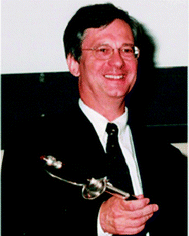Introduction to the themed issue in honour of Bernard Meunier
Bernard Meunier is one of the world's key scientists in biological and therapeutic chemistry, with more than 375 peer-reviewed publications, more than 14
![[thin space (1/6-em)]](https://www.rsc.org/images/entities/char_2009.gif) 520 citations, an H index equal to 62, 32 patents, and 370 invited conferences and seminars.
520 citations, an H index equal to 62, 32 patents, and 370 invited conferences and seminars.Bernard Meunier was born in Poitiers, France, in 1947. He completed his first graduate degree (Doctorat 3ème Cycle) under the supervision of Robert Corriu at the University of Montpellier, France, in November 1971 and then his Ph.D. (Doctorat d'État) under the supervision of Hugh Felkin at the University of Orsay, France, in June 1977.
Bernard Meunier founded and managed, during the 1979–2006 period, the very high-level research group entitled “Biomimetic Oxidation” at the CNRS Coordination Chemistry Laboratory in Toulouse, France (Laboratoire de Chimie de Coordination du CNRS à Toulouse, LCC). Since 1979, his activity has included studies on homogeneous phase catalytic oxidations (epoxidation and hydroxylation) and on pollutant oxidation catalysts modeling non-heme enzymes (cytochrome P-450, peroxidases, catalase and chloroperoxidase). Investigations also concerned non-heme catalysts (new polypyridine ligands), artificial endonucleases (DNA strand breaks by oxidation), and the mechanism of action of anti-TB drugs (isoniazid), as well as of artemisinin. His impressive results on the discovery of new antimalarial and anti-schistosomiasis agents (“trioxaquines”), and on the role of metal ions in Alzheimer's disease (specific copper chelators as potential therapeutic agents) should also be emphasized.
Bernard Meunier has had intense editorial activity. He was editor of Eur. J. Inorg. Chem. (1998–2004) and associate editor of the Bull. Soc. Chim. Fr. (1996–1997). He was a member of numerous editorial boards, including New J. Chem. (1995–1997, 2001–2007), J. Mol. Catal. (1996–2006), J. Biol. Inorg. Chem. (1996–1999), J. Phthalocyanines (1997–2000), J. Organomet. Chem. (1999–2008), C. R. Acad. Sci. (2000–present), ChemBioChem (2005–2010), Acc. Chem. Res. (2005–2007), Bioinorg. Chem. (2005–2008), Angew. Chem., Int. Ed. (2006–2013).
As President from October 2004 to January 2006, Bernard Meunier occupied the highest position in the CNRS. During the period of February 2006 to January 2011 he headed a research and development company called “Palumed” that he founded in 2000. At present, Bernard Meunier is an emeritus exceptional class research director of the CNRS at the LCC (Toulouse).
Bernard Meunier was elected as a member of the French Academy of Sciences in November 1999 and a foreign member of the Polish Academy of Sciences in May 2005. He is a member and several times president of a very large number of institutions and foundations. He has received numerous prestigious distinctions and prizes, including the silver medal of the CNRS (1991), the Prize of the Coordination Chemistry Division of the French Chemical Society (1994), the “Clavel” Prize of the French Academy of Sciences (1997), the “Berthelot” Medal of the French Academy of Sciences (1997), the “Descartes-Huygens” Prize of the Royal Academy of Letters and Sciences of The Netherlands (2001), the Vermeil Medal of the “Société d'Encouragement au Progrès” (2001), the 21st “Grand Prix Michel Benech” of the Midi-Pyrenees Innovation Competition (2001), the Von Humboldt–Gay Lussac award (2002), the “Le Bel” Prize of the French Chemical Society (2007), and the Gold Medal of the “Société d'Encouragement au Progrès” (2009). In 2006, Bernard Meunier was named “Chevalier” in the French “Ordre de la Légion d'Honneur”.
Recently, Bernard Meunier was elected as Vice-President, for the 2013–2014 period, of the French Academy of Sciences, one of the most prestigious academic institutions in France. Bernard Meunier was also recently nominated as a distinguished Professor in the Chemistry Department of the University of Technology of Guangdong in Guangzhou (China).
The outstanding reputation of Bernard Meunier is illustrated not only by the number and the quality of contributions of this New Journal of Chemistry themed issue, but also by the diversity of the research topics presented by his colleagues worldwide. Indeed, his background and creativity allowed him to delve deeply into different research topics in the fields of chemistry, biology, diagnostics, material science and catalysis, in a pioneering manner that was far from a routine exploration of given problems.
Bernard Meunier has always been a defender of the role and importance of chemistry in science in general and more particularly for therapeutic innovation, a topic where he predicts a brilliant and creative future for chemistry.
Azzedine Bousseksou (Guest editor) and Jean-Pierre Majoral, Laboratoire de Chimie de Coordination, CNRS, Toulouse, France, www.lcc-toulouse.fr
| This journal is © The Royal Society of Chemistry and the Centre National de la Recherche Scientifique 2013 |

